I’m sure there are many people who would love to work at the United Nations. In fact, I count myself among them. But a lot of these people probably assume that landing a job at the UN would be too difficult and give up on the idea without even trying. Challenges and setbacks are unavoidable when pursuing one’s dreams, but Masayoshi Suga, who now works as a public information officer (news writer) at the UN News Centre, persistently strived to achieve his goal of working at the UN and finally got a job in the News & Media Division of the UN Department of Public Information at the age of 47. I interviewed him for “American View” in the hope that he would be able to offer some advice and encouragement to Japanese young people who are anxious about their future and wondering whether they should study abroad.
Studying in the U.S. as a turning point
Suga’s goal when he was in college was to become a high school English teacher. He knew he would need to have good language skills in order to teach English, so he decided to study in the U.S. Taking a leave of absence in his junior year, he went to study English in the U.S. for ten months after saving up enough money from scholarships, his parents, and part-time jobs. While studying English at a language school in Wisconsin, Suga improved his English skills not just through coursework, but also by actively building friendships with the other international students he lived in the dorm with. His friends often asked him about Japan, but he found it difficult to answer their questions. He was dismayed by how little he knew about his own country and realized that he needed to learn more about Japan.
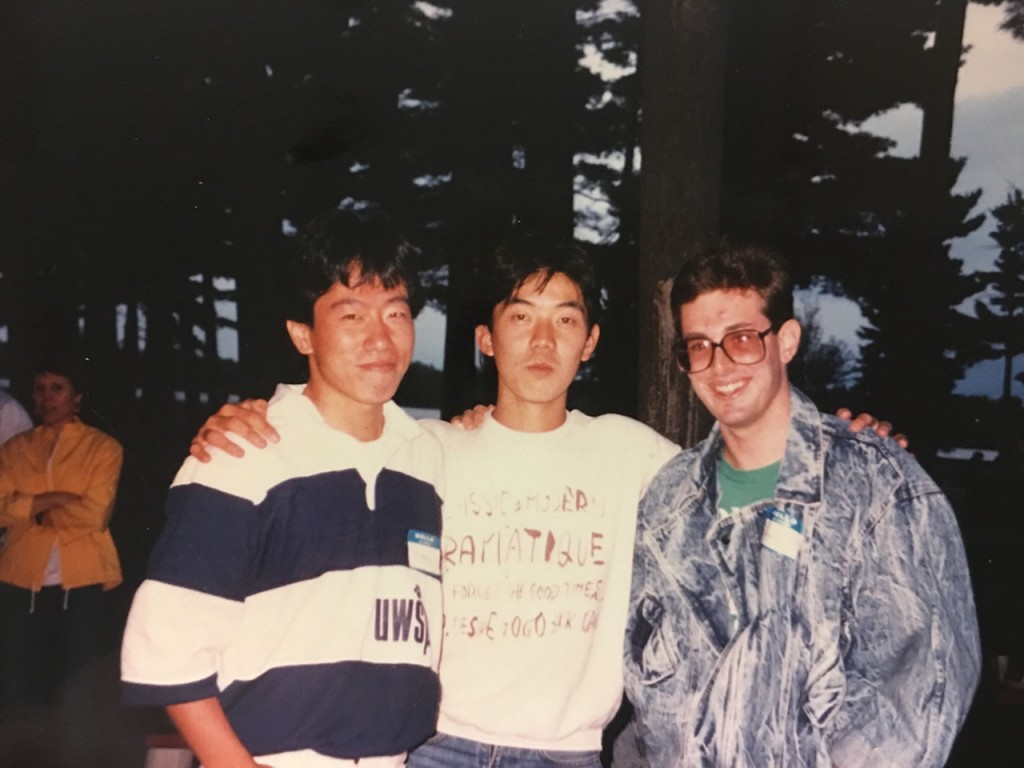
Masayoshi Suga (left) poses for a photo with friends from his language school in Wisconsin.
Studying in the U.S. was a fantastic experience for Suga. But just when he began to feel capable of functioning in English, the ten months were up and it was time for him to return to Japan. “I’m definitely going to come back to America one day,” he told himself.
After returning to Japan, Suga immediately began looking for a job. Before he went to the U.S., he had thought that his only option was to become a teacher. But studying abroad gave him a broader perspective and he began to think differently. Studying in the U.S. became a major turning point in Suga’s life. However, he was already undergoing teacher training when he began exploring other career options, so his job search became unfocused. As a result, he got confused and couldn’t figure out what he really wanted to do. Nevertheless, Suga received several job offers and ended up taking a position as a reporter at an English-language newspaper.
Turning a setback into an opportunity
In his mid-30s, Suga began to feel a strong urge to go back to the U.S. He decided to see if he could find a job there. He had heard that the CNN headquarters in Atlanta was about to launch a Japanese news site and was looking for an editor who could speak both Japanese and English. Suga applied for the position and got it, enabling him to realize his dream of returning to the United States.
After that, however, he suffered an unexpected setback. Although online news was rapidly gaining ground, the “dot-com bubble” burst just a year after Suga went to the U.S. CNN pulled the plug on the Japanese news site and Suga lost his job. “I didn’t want to go back to Japan after just one year working in the U.S.,” said Suga. He searched for a way to stay in the U.S., and ended up deciding to go to graduate school at Georgia State University, where he enrolled in the MBA program. Since he already had more than 10 years of experience in journalism, Suga thought it would be best for him to focus on a different subject. Among the specializations offered in the MBA program, he chose Information Systems so he could learn more about the Internet business.
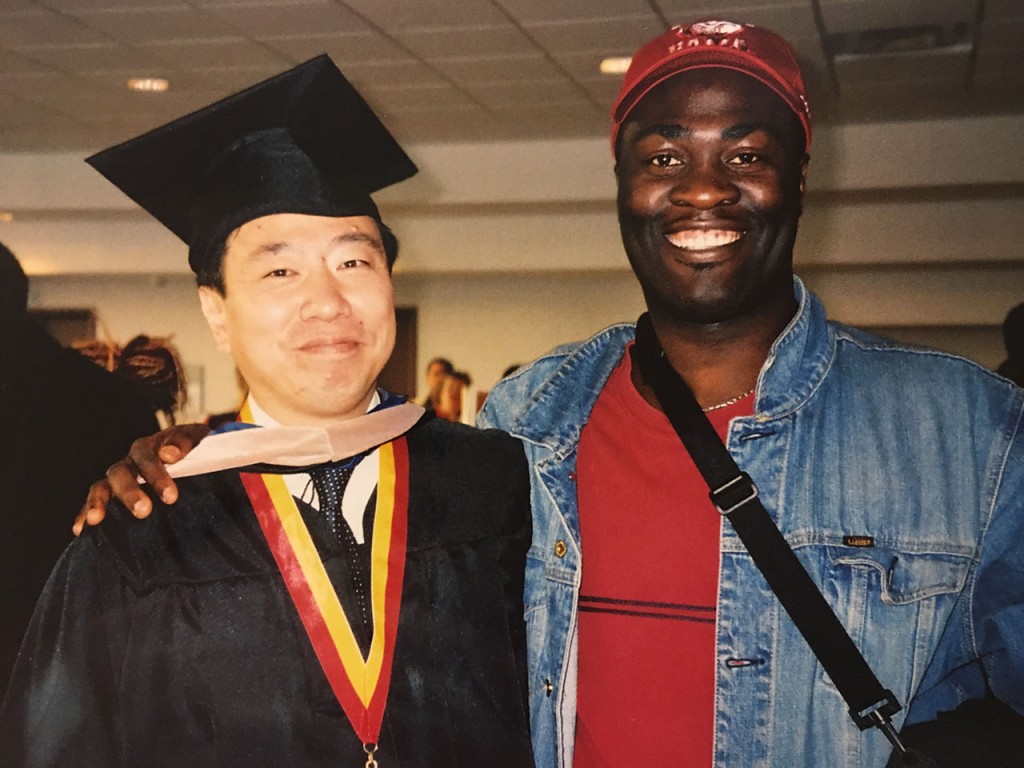
Suga with a friend at his graduation from the MBA program at Georgia State University.
Suga relished the high level of education offered by the graduate program. “I never skipped a class,” he said. On days when he didn’t have any classes, he studied in the library. He aimed to be the first student to raise his hand whenever a professor asked a question. In American universities, class participation is an important factor in evaluating academic performance. Thanks to his assertive attitude, Suga’s classmates chose him at the end of the term as the most active contributor to the program. He also excelled in his academic work.
Suga also played an active role as a leader in group projects. For a project to develop an online application, Suga’s team developed a photo sharing app. “In retrospect, if we had launched the app as a commercial endeavor, we might have been able to create a popular app before Instagram was launched,” said Suga. “The experience taught us the difference between developers who put their ideas into practice and those who don’t. Just having an idea isn’t enough. You have to act on it,” he added with a smile.
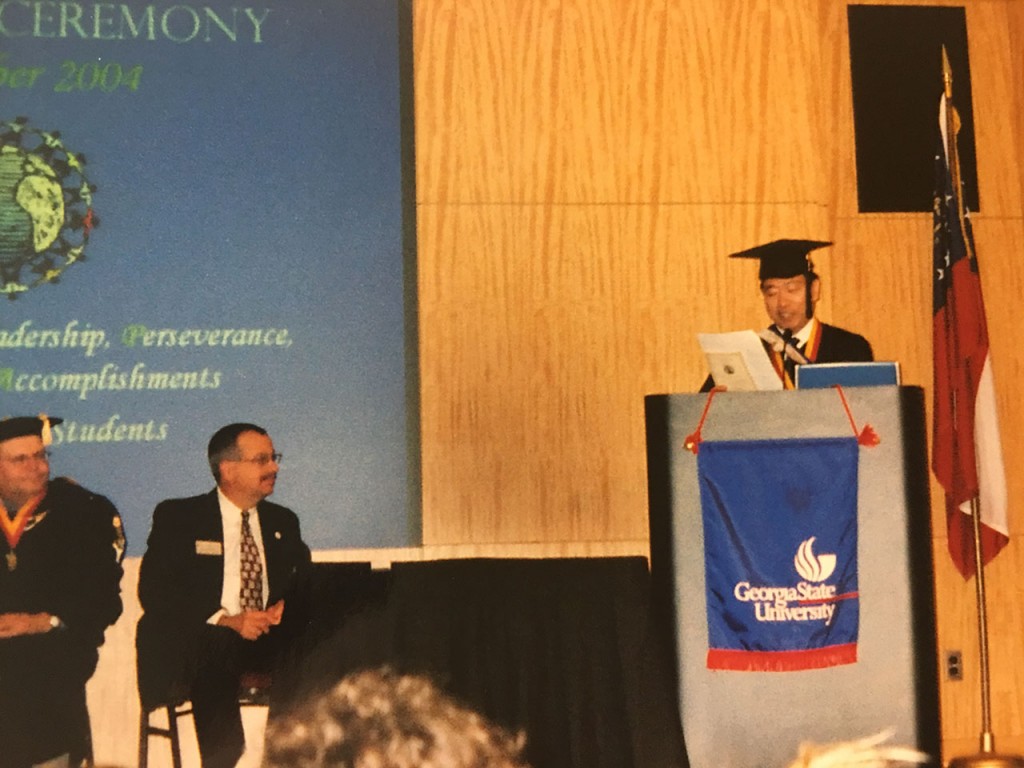
Suga delivering a speech at his graduation ceremony at Georgia State University.
One of biggest problems Suga encountered in graduate school was the cost of tuition. Since he wasn’t receiving any financial assistance from a company or foundation, he had to rely on his meager savings. In order to pay his way through school, Suga focused his energy on landing a position as a research assistant for a professor. That way his tuition would be waived and he would also get paid for the work. He managed to get a hired as a research assistant in his second term.
Making progress through diligent efforts
After finishing the graduate program, Suga went back to work in the media industry for about six and a half years. After participating in an UN career guidance program, he decided to apply for a public affairs position there. Even though internal candidates were given priority in the selection process, Suga was hired and began working at the UN in March 2012 at the age of 47. When I asked him what contributed to his finally landing a job at the UN, Suga said, “Losing my job was actually very beneficial and ended up being an asset.” Being unemployed apparently gave him a chance to think about his abilities and goals, and looking for work motivated him to improve himself.
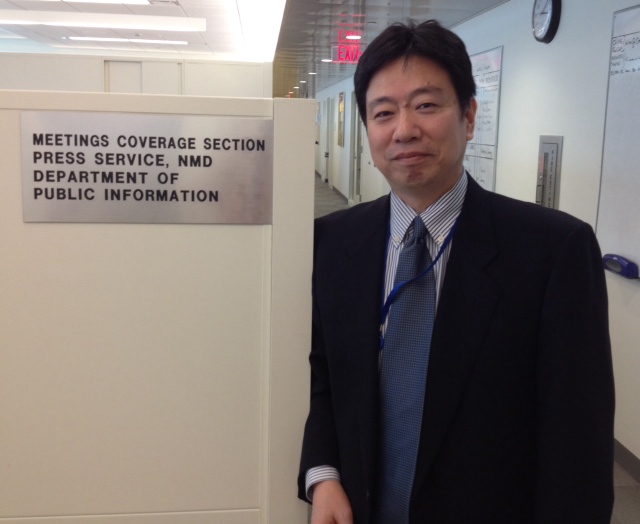
Suga at his office at the UN Headquarters in New York.
As I wrote at the beginning of this article, Suga had thought about working for the UN many times in the past, but had never taken the idea seriously, assuming it was out of his reach. But he persevered and finally managed to land his dream job. I asked him what he thinks is important when trying to achieve a goal even if it takes a long time. Suga quoted a Japanese saying that can be literally translated as “polishing one sword for 10 years.” It means that it is necessary to continue training for a long time in order to demonstrate one’s ability in critical situations. “Working diligently on what you need to do each day for 10 to 20 years can lead to great success,” explained Suga.
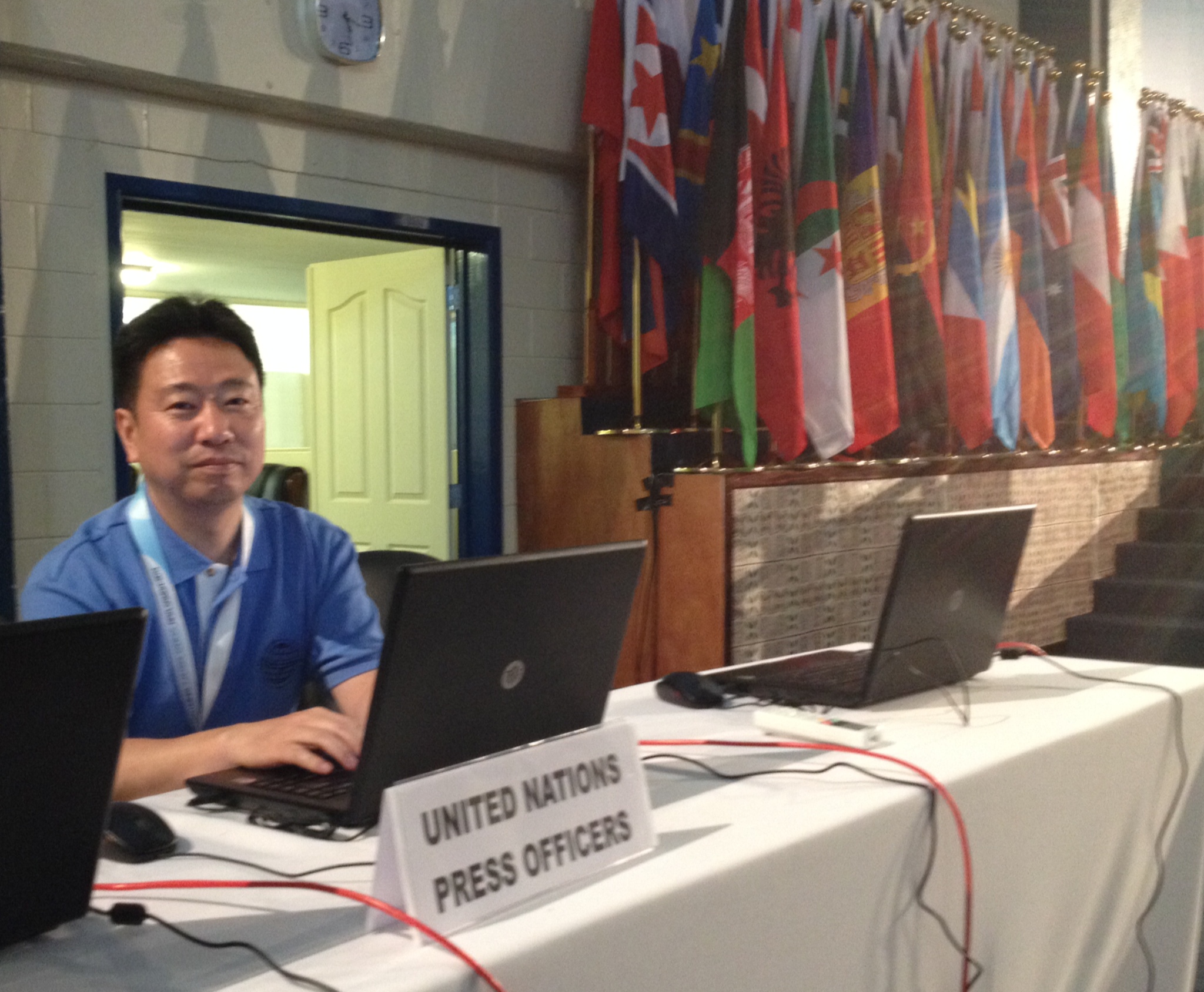
Suga covering an international conference in Samoa on Small Island Developing States (SIDS) in 2014.
Crisis breeds opportunity
Suga also gave the following advice to young people who have experienced setbacks or are worried about their future: “In Japanese, the same character is used in both the words ‘crisis’ and ‘opportunity.’ This means that a crisis can lead to an opportunity. If you experience a setback, it’s important to have someone you respect as a role model in your life.”
Despite losing his job, Suga never gave up and steadily devoted his efforts to realizing his dream of working at the UN. This makes his advice convincing and encouraging. Suga’s experiences are living proof of the saying: “Every failure is a stepping stone to success.”
We create our own barriers
Since Suga studied in the U.S. on two different occasions, I asked him to offer some advice for students who are unsure or trying to decide whether to study abroad.
“I think students feel apprehensive about studying abroad for all sorts of reasons. But students from around the world are finding ways to overcome every obstacle that stands in their way. Some of them save money by staying at their friends’ places or getting second-hand books from older students. Many also apply for scholarships and work as teaching assistants. These are just some of the ways to reduce the cost of studying abroad. I think Japanese students should try more actively to find ways to overcome obstacles. However, I believe the biggest barriers are the ones in our own minds. People tend to set their own limits by deciding something’s too hard for them. I did the same thing myself. The first thing we need to do is to break through these barriers in our minds. I also believe that hope is not something we can get from someone else, but something we need to create on our own. You are the hero of your own story, so why not go out there and try something new? I believe you can only produce results if you accept the challenge.”






COMMENTS4
Thanks a lot very helpful and interesting content…it’s article very nice… thanks you
Thank you for writing this article.
Thank you for writing this article.
wow, very interesting article.thank you, man.
I respect next time this article is helping others people. thank you.
LEAVE A COMMENT
TOP